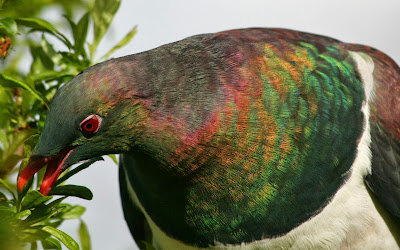 |
| New Zealand Pigeon Hemiphaga novaseelandiae |
South Island Fantail
Rhipidura fuliginosa fuliginosa
North Island Fantail
Rhipidura fuliginosa placabilis
Welcome Swallow
Hirundo Tahitica
Black-backed Gull
Larus dominicanus
Red-billed Gull
Larus novaehollandiae
White-faced Heron
Ardea novaehollandiae
Variable Oystercatcher
Haematopus unicolor
Black Swan
Cygnus atratus
Australasian Gannet
Morus serrator
Gannet tidying up after Homo sapiens
Tui
Prosthemadera novaeseelandiae
North Island Fantail
Rhipidura fuliginosa placabilis
Welcome Swallow
Hirundo Tahitica
Black-backed Gull
Larus dominicanus
Red-billed Gull
Larus novaehollandiae
White-faced Heron
Ardea novaehollandiae
Variable Oystercatcher
Haematopus unicolor
Black Swan
Cygnus atratus
Australasian Gannet
Morus serrator
Gannet tidying up after Homo sapiens
Tui
Prosthemadera novaeseelandiae
















What a nice surprise to see how the NZ Birds page has grown! Very nice photos there Dad. I imagine that birds, being the lively, animated creatures that they are, aren't the easiest of subjects to photograph.
ReplyDeleteI didn't know there was a North and South Island fantail. We have recently discovered a small family group of banded rail living out at Sandspit. A fine looking bird.
Paulette
You are correct in saying they are not the easiest creatures to capture on the camera, hence my great respect for those who took such wonderful photographs using film!
DeleteI have only seen the banded rail on Wallis Island - the mongoose did for them on Viti Levu. The Fijians have a saying, "Sa ketekete ni bici na lomalagi," said of a beautiful clear sky.
The scientific name for the banded rail is a bit of a trap - Dick Watling in A Guide to to the Birds of Fiji & Western Polynesia uses 'Gallirallus philippensis', and Birds of New Zealand by Hugh Robertson & Barrie Heather, and Reader's Digest's Complete Book of New Zealand Birds both use 'Rallus philippensis'.
Perhaps I should clarify - the Fijian saying means 'the belly of the banded rail is like the sky' said of a beautiful clear sky.
Delete